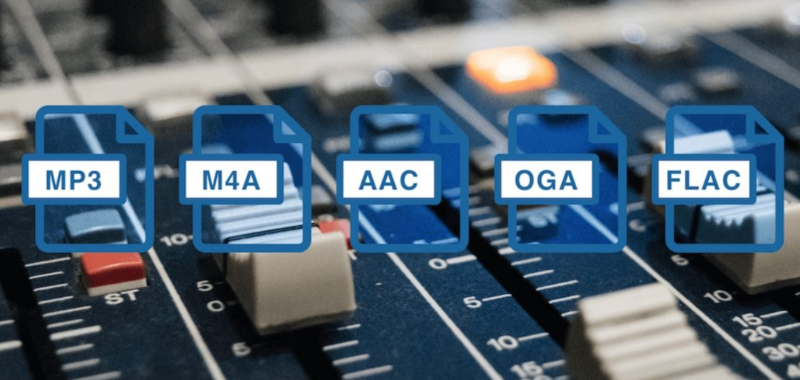The difference between the two formats is that AAC is a proprietary format that requires licensing fees whereas OGG is an open source, royalty-free format.
The aac vs mp3 is a question that has been asked many times. AAC and OGG are both audio codecs, but they have different features.
We earn money from qualifying purchases made on our website as an Amazon Associate. If you buy anything via our website’s links, we may receive a small commission from Amazon or other affiliate programs. For additional information, please read our full affiliate disclosure/TOS.
You’ve probably come across the AAC and OGG file formats if you use Apple Music or Spotify. These file types are used to broadcast music over the internet.
So they’re both used to stream music, but which is better? Continue reading to learn about the key similarities and differences between these files so you can decide which format is ideal for you.
Streaming services often utilize the lossless file formats AAC and OGG. The major difference between the two is that OGG can record at a maximum bitrate of 320 kbps, while AAC can only record at a maximum bitrate of 256. OGG, on the other hand, is compatible with a smaller number of devices.
Table comparing AAC and OGG
| Feature | AAC | OGG |
|---|---|---|
| Extensions of Files | .aac | .ogg,.ogv,.oga,.ogax,.ogam,.ogam,.ogam,.ogam,.ogam,.ogam,.ogam,.ogam,.ogam,.ogam,.ogam,.ogam, |
| Support and Convenience | The format is supported by a large number of contemporary players and platforms.
It has a lot of iTune and Apple Music compatibility, as well as Youtube streaming. |
The format is compatible with a wide range of commercial and non-commercial media players, including various GPS receivers and portable media players.
Enjoys a good fight. Support for Spotify |
| Comprehension | Lossy | Lossy |
| File Size | three to five times smaller | three to five times smaller |
| Sound quality is excellent. | Good | Good |
| Bitrate with the most data | 256 Kbps | 320 Kbps |
What is the difference between AAC and OGG VORBIS?
What exactly is AAC?
The acronym AAC stands for “Advanced Audio Coding.” It’s a lossy and compressed audio coding format that’s mostly superseded MP3. AAC performs somewhat better than MP3 at the same bit rate, which is appreciated by MP3 fans.
When compared to MP3, AAC allows for a greater number of channels (up to 48) and sample speeds (from 8 kHz to 96 kHz).
Furthermore, above 16 kHz, AAC has superior coding frequencies. Other technical enhancements have also been made.
Many media players now use AAC as their default audio format. iTunes, iPad, iPod, Nintendo DSi, Playstation 3, and numerous Nokia Series 40 phones are the most prevalent. Currently, the format may be found in certain in-dash vehicle audio systems.
AAC is also included in MP4 file extensions like.m4v,.m4r,.m4p,.m4b, and.m4a.
What exactly is OGG?
OGG is a lossy, compressed file format that enables high-quality music streaming.
The word OGG isn’t an abbreviation. It’s an acronym for “ogging,” a jargon word from the computer game Netrek that meaning “forcefully accomplishing anything.”
Ogg Vorbis uses the.ogg filename extension. Ogg Vorbis is a patent-free, open-source, non-proprietary compressed audio container format.
Vorbis is currently a part of the Xiph.org multimedia project and refers to a specific codec that is usually placed in the Ogg container.
It’s often used for audio of medium to high quality (8kHz-48.0kHz, 16+ bit, polyphonic). These files are usually encoded at bitrates ranging from 16 to 128 kbps, both fixed and variable.
This open-source format, contrary to common perception, includes several separate streams for metadata, text (such as captions), and video. Spotify is the most popular music streaming service that uses this format.
Because the format is free, it is not subject to copyright limitations, thus it may be found with filename extensions like as.ogg,.ogv, and. Opus.
What Are Audio Files That Have Been Losslessly Compressed?
Lossy compression is the process of eliminating specific components of audio data from files in order to reduce file size.

When you convert an MP4 to an MP3, for example, you lose some data, especially pictures. We use the word “lossy” to describe this. There is some sound quality loss when the compression algorithm is employed to compress the audio inside your file.
AAC and OGG, like MP3, are ideal for storing music on tablets and iPods. Furthermore, they are compatible with a broad range of contemporary playback devices.
Both of these formats, however, are lossy. To make your audio device take up less space, you must lose a lot of data. Apple Music streaming, YouTube streaming, and iTunes downloads all support AAC.
When it comes to Spotify streaming, OGG Vorbis is a good choice. Of part, the efficient codec or algorithm in AAC and OGG is a reaction to the lossy, compressed music quality in these two formats.

Lossy compressed formats are diametrically opposed to lossless compressed formats. The audio compression in lossless formats guarantees that no important audio data is lost. For example, you may compare lossy AAC to lossless FLAC in our AAC versus FLAC comparison.
In other words, the final file size may be somewhat lower than the original owing to the removal of non-essential material, but the difference will not be significant. The original sound quality, however, remains preserved.
Comparison between AAC and OGG
Audio Quality and Lossy Compression
AAC and OGG, as previously stated, are lossy formats. As a result, they operate by removing part of your audio’s important and non-essential components.
So, unlike lossless formats, when you select AAC or OGG, you can anticipate an average quality of music appropriate for everyday listening.
When utilizing either the lossy or lossless formats, however, most people find it difficult to tell the difference in sound quality. When they try to compare AAC and OGG, the same thing happens.
Sound Quality of AAC vs. OGG
Because AAC and OGG are lossy formats, their sound quality is sufficient for most casual music listeners.
At a maximum of 256 Kbps, AAC is lossy. OGG, on the other hand, has a maximum bitrate of 320 Kbps and is lossy. The following are the major differences between AAC and OGG sound quality:
- The data compression algorithm that was employed
- Your audiophile gear
- The ability to tell the difference between uncompressed and compressed data.
Overall, the sound quality of AAC and OGG is acceptable for anybody who isn’t an audiophile.
Uses of AAC vs. OGG
YouTube and other streaming services utilize AAC. It is supported by Apple devices and services such as Apple Music and iTunes downloads. However, since AAC is patented, you’ll need a license to utilize it lawfully.

OGG, on the other hand, is a free and open-source format. This implies that you may use it for free from any location. When compared to AAC, however, it has a smaller and more restricted media player support.
It only works with Spotify and a few other multimedia players. Remember that if you have an iPhone, Nokia Series 40 phones, DivX Plus Web Player, iPhone, iPad, or iTunes, you can only utilize AAC and obtain almost the same level of quality.
Which Should You Choose: AAC OR OGG?
Let’s evaluate their performance at various bit rates to see which audio format is best.
At Different Bitrates, AGG versus OGG
| Bit Rate | Results |
|---|---|
| 64k | AAC > OGG |
| 96k | AAC > OGG |
| 128k | OGG > AAC |
| 192k | OGG > AAC |
| 224k | OGG > AAC |
| 256k | OGG > AAC |
| 320k | OGG > AAC |
| >320k | It’s getting close to becoming lossless. It’s difficult to tell them apart. |
The performance of AAC is superior than that of OGG at 64k and 96k. However, 192k at 128k. OGG works better at 224k and 320k.
The differences between AAC and OGG will be difficult to distinguish at higher bit rates. When bitrates exceed 320 kbps, you’re getting close to lossless audio, and it’s difficult to discern the difference as the quality of the siles improves.
It’s simpler to discern the difference between lossy and lossless audio than it is between them. As a result, arguing that one is better than the other simply on the basis of bit rate may not be a smart idea.
You may need to listen to them while playing them under a single median player.
Ordinary users, on the other hand, may select AAC if they want a format that is compatible with a wide range of commercial and non-commercial devices. Of course, if you want to use the software for recording or other professional purposes, you’ll need to get a license.
If you want an open-source format that works with some of your devices, though, OGG is the way to go. The main drawback is that it is only compatible with a smaller number of devices than AAC.
Because both are compressed lossy formats, the sound quality is sufficient for most users. Audiophiles may utilize any of them at bitrates higher than 320k, although such files are uncommon.
Conclusion
The fact that OGG can be encoded at 320Kbps makes it superior than AAC in terms of quality. However, it is only compatible with a limited number of devices.
Many regular consumers, on the other hand, may be unable to distinguish the variations between the two formats recorded at the same bitrate.
It depends greatly on your listening habits and ability to distinguish timbres and texture from different audio codecs, therefore the best thing to do is experiment with AAC and OGG on your own.
OGG is a format that is used by many audio codecs. It is a lossy format, which means it will reduce the quality of your audio file. AAC is an open source and patent-free format that has been around for a while. Reference: opus vs aac.
Frequently Asked Questions
What is the best format for audio quality?
The best format for audio quality is MP3.
Is Ogg Vorbis good quality?
Ogg Vorbis is a lossy compression format, meaning that it will not provide the same quality as MP3. However, this is still quite good compared to other formats such as AAC or WAV.
Is Ogg higher quality than MP3?
Ogg is a higher quality audio format than MP3.



